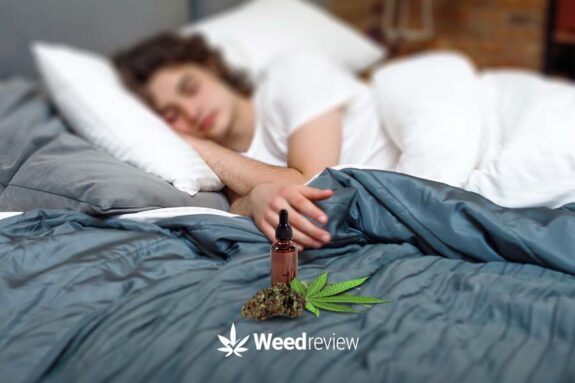
Terpenes for Sleep: 5 Terpenes for Insomnia and How to Take Them

Table of Contents
Everyone dreams of a good night’s sleep. For some, it comes easily. For others, it can be a struggle. But what if the secret to better rest was tucked away inside the diverse spectrum of plants? If you’ve ever sipped chamomile tea before bed, inhaled the calming aroma of lavender essential oil, or taken an herbal supplement for sleep, you’ve already experienced the power of terpenes.
Terpenes are also found in abundance in cannabis. Various elements can make a marijuana product a potential game-changer for sleep struggles. It could be the blend of cannabinoids like tetrahydrocannabinol (THC), cannabidiol (CBD), and lesser-known molecules like cannabigerol (CBG) and cannabinol (CBN). What’s common is all of them use terpenes.
In this article, we will take a quick look at what they are and explore the leading terpenes for sleep.
What are terpenes?
Terpenes are natural aromatic compounds found in many plants.
They give plants their unique smells and tastes. Think of the sweet aroma of a ripe orange or the soothing scent of lavender – that’s all thanks to terpenes. But they’re not just for fragrances. Terpenes also play a big role in how plants, like cannabis, affect our bodies and minds.
Cannabis is a botanical powerhouse when it comes to terpenes. They are largely responsible for the varied aromas and flavours of different cannabis strains, but there’s more. They also interact with cannabinoids to influence their effects on the body – a phenomenon known as the ‘entourage effect.’ This effect can enhance the potential benefits of cannabis, which include promoting better sleep.
Sleep-promoting terpenes
There are 20,000 terpenes in the plant kingdom. Within marijuana species, we know of at least 150, many of which are known to help improve sleep and promote calming, relaxing effects.
The 5 most prominent sleep terpenes are mentioned below.

Myrcene
Myrcene is one of the most common terpenes in cannabis. It is renowned for its earthy, musky scent. This terpene is also present in hops, lemongrass, and thyme.
The magic of myrcene lies in its potential sedative effect. Besides promoting relaxation and enhancing mood, myrcene is believed to aid sleep by encouraging a sense of calm. This makes it a key player in any cannabis strain used for sleep.
Caryophyllene
This spicy, peppery terpene is not only found in cannabis but also in black pepper and cloves.
Caryophyllene is unique because it can interact with our bodies as cannabinoids do. It is known for its anxiolytic, anti-inflammatory, and analgesic properties.
Its ability to help alleviate stress and anxiety makes it potentially beneficial for sleep, much like how some people find a warm cup of clove tea comforting before bed.
Pinene
As the name suggests, pinene is found in pine trees, giving them their refreshing scent. It’s also found in rosemary, basil, and cannabis.
Pinene can potentially counteract anxiety, helping to induce a restful state conducive to sleep – similar to how a walk in a pine forest or using rosemary essential oil can leave you feeling rejuvenated and calm.
Terpinolene
Although not as common in cannabis, terpinolene is prominent in plants like lilacs, nutmeg, cumin and apples, giving them their fresh, sweet scent.
Some studies suggest terpinolene has sedative properties, which could contribute to why these scents are often associated with relaxation and tranquillity.
Linalool
You’ve experienced linalool if you’ve ever relaxed to the soothing scent of lavender. It’s what gives the plant its signature fragrance.
Also found in cannabis, linalool is known for its calming properties, helping to ease anxiety and stress, which often interfere with a good night’s sleep.
How do terpenes help with sleep?
To understand how terpenes help with sleep, it’s important to get a little into the science of sleep.
Sleep isn’t just an “off switch” for your body. It’s a complex process that involves various neurotransmitters, or chemical messengers, in your brain. These include serotonin, which helps regulate your sleep-wake cycle, and gamma-aminobutyric acid (GABA), which slows down brain activity to allow for restful sleep. When these and other neurotransmitters work together properly, you can fall asleep easily and stay asleep throughout the night.
Now, where do terpenes come into this picture? Well, certain terpenes can interact with these neurotransmitters and influence their activity.
Take myrcene, for instance. It’s believed to enhance the activity of GABA in your brain. Doing this helps slow down brain activity, leading to relaxation and helping you fall asleep.
Linalool also interacts with GABA. It boosts GABA’s activity and reduces the activity of glutamate, a neurotransmitter that increases brain activity. This dual action can help calm your mind and prepare it for sleep.
Similarly, terpenes like pinene have shown the potential to influence serotonin levels.
In short, while terpenes give plants their unique smells and flavours, they also interact with your brain in ways that can promote relaxation and sleep. They work in harmony with your body’s own chemical messengers, helping create the right conditions for you to fall asleep and stay asleep throughout the night. This is why cannabis, rich in a variety of terpenes, has become a popular natural aid for sleep.
At the same time, it might be worth noting that the effects of cannabis and terpenes can vary between individuals based on factors like genetics, metabolism, and tolerance. Not everyone may experience the same benefits.
How to take terpenes for sleep?
Now that we know how terpenes can help promote better sleep, the next step is figuring out how to include them in our routine. Here are a few ways you can explore:
Cannabis strains
Different cannabis strains have distinct terpene profiles. Some strains are rich in sleep-promoting terpenes like myrcene or linalool.
For example, Granddaddy Purple is known for its high myrcene content, making it a popular choice for those seeking better sleep. Using these strains in the form of vaping, oils, or edibles can be an effective way to benefit from these terpenes.
Other well-known strains with sleep terpenes are:
Essential oils
Essential oils are a good source of terpenes. Lavender oil – rich in linalool – or pine oil – rich in pinene – can be used in aromatherapy to help promote relaxation and sleep. You can add a few drops to a diffuser in your bedroom or include them in a pre-sleep relaxation routine with a warm bath or massage.
Terpene extracts
Some companies have started to produce dietary supplements and topicals that contain specific terpenes. These concentrated terpene extracts are a practical choice for those who want to benefit from the potential sleep-promoting properties of terpenes without using cannabis.
Herbal teas
Herbal teas like chamomile, lavender, and lemon balm are rich in sleep-promoting terpenes. Consuming these teas before bedtime can help you sleep better.
Fresh produce & herbs
Some fruits, like mangoes, contain terpenes such as myrcene. Culinary herbs, including basil and thyme, also have terpenes. Integrating these foods and herbs into your diet can provide an array of terpenes.
Topicals & bath products
Terpene-infused lotions, balms, and bath bombs can be applied directly to the skin or added to baths. This allows for absorption through the skin, promoting relaxation and aiding in sleep.
Conclusion
Getting good sleep sometimes needs a nudge from nature. We looked at five natural helpers: Myrcene, Caryophyllene, Pinene, Terpinolene, and Linalool. These aren’t just fancy names; they are smells, or terpenes, found in nature. For example, if you’ve smelled mangoes or walked through a pine forest, you’ve met some of them.
While some people turn to special cannabis types for these terpenes, you don’t always have to. They’re also in things we see or use every day. Think about oils from plants, sipping on herbal teas, or even some fruits and skin products. So, next time sleep feels far away, remember nature has some scents that might just help.


